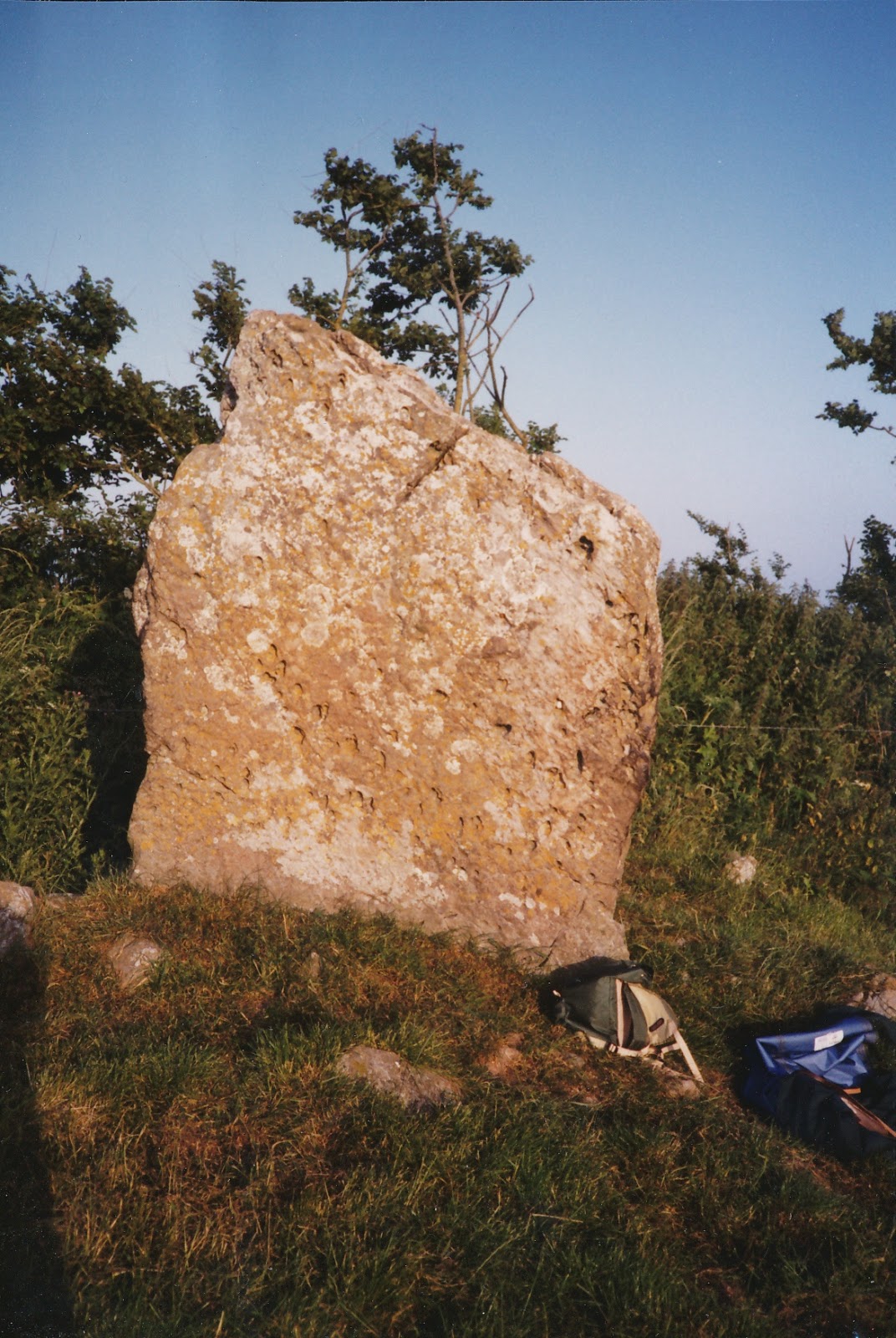Friday - late!
 |
| Harold Stone, Stackpole viewed from appx south west |
In the last post I promised I would talk about the things parents do for you. On this occasion my mum and dad were given an investigative task in the field of archaeo-astronomy. You will hopefully recall me explaining about the "Dancing Stones of Stackpole" and in particular the viewshed from the Harold Stone. To get up to speed with this, then have a look back at my last post.
My previous post is here.
I mentioned that my interests had moved away from studying various megalithic sites in the UK and Europe (this was sometime in the 1980s), and I was now researching the local history of two small parishes in South Pembrokeshire - Warren and St. Twynnells. The link below will allow you to download a Google Earth file for the parishes that shows their extent as a coloured overlay.
St Twynnells Parish: http://sdrv.ms/SpxnK9
Warren Parish: http://sdrv.ms/Yg4uRg
 |
| Harold Stone, Stackpole, viewed from north-west |
It was a strange request and I am sure that my dad thought I was barmy - but he was the photographer so he had to go! I asked them to get there well before sunset, and described, over the phone, where the Harold Stone was and the importance of taking the photograph with their backs to the stone and so on. So, on 21 June, they both duly clambered over the gate into the field (Horestone Park, by the way) and took the pictures needed. It was a beautiful evening and they both enjoyed the adventure, but mum was a bit wary of the cattle. The bonus was that they managed to find some mushrooms too!
A week or so later, the photos arrived in the post (no email or Picasa then)
 |
| Mid-Summer Solstice sunset take from the Harold Stone, Stackpole, by my mum and dad, 21 June 1992 |
A few weeks later, I was at a talk on Pembrokeshire Archaeology, put on by the National Park Authority. Someone in the audience, asked the speaker about the alignments of prehistoric monuments. In part of his answer, the speaker revealed that the direction of sunset and sunrise were different in prehistory, due to the "precession", or wobble of the Earth. Aha! perhaps, in the Bronze age, the sun DID set behind St Twynnells Church and over the Devils Quoit! Of course, the church was not there then, but its neat alignment provided a modern marker for the event.
But....how do you find out the direction of mid-summer sunset in Pembrokeshire in the Bronze Age?!!?
I waited a few years, but the answer was - with a computer!
In the meantime, I was continuing to research the local history of Warren and St Twynnells. One standard technique I used was to read and analyse all the wills I could track down for people who had lived ( and died) in the two parishes. Often these wills had an inventory of all the deceased's property appended to them, for probate purposes, and where these made mention of the names of rooms within the dead person's house, you could get an insight into what their houses might have been like.
Poyer is a well known name from South Pembrokeshire, particularly famous (or infamous) in the seventeenth century. Amongst the surviving wills for St Twynnells Parish, is that of William Poyer. He was not a wealthy man.The inventory of his possessions was quite meagre:
It consisted of an old cow and two heifers, one colt, old brass items and so on. The inventory was made in 1671. No rooms are mentioned and we have no idea as to where in the parish he lived. However, his will is very useful to us in our quest to understand the standing stones of Stackpole. Of all the wills I have read it is the one that has given me the most excitement!
The excitement comes from the fact that he was very particular about where he wished to be buried.
More about this later! What a cliff hanger!
Next time: Stepping back into the Bronze age with a computer, pledging your troth in Loveston farmyard and the the burial of William Poyer.

No comments:
Post a Comment
If you can add to the information in any of my blog postings, or have a question, please write a comment, or use the contact form I will endeavour to respond as soon as I can.